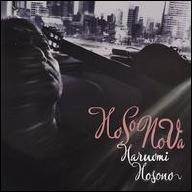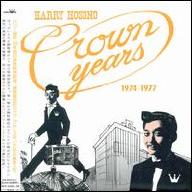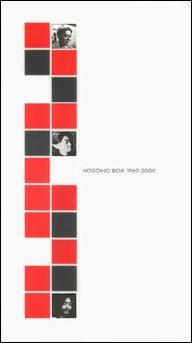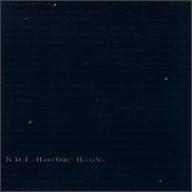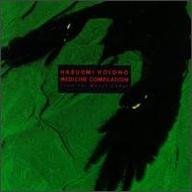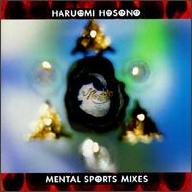Born in Tokyo in 1947, Hosono studied sociology at Rikkyo University, forming several bands while still in school. His first band, the psychedelic art-rock group Apryl Fool, released their self-titled LP in 1969 and broke up the same year. Throughout the early and mid-'70s, he played the part of studio musician and bassist, and formed two fusion-pop projects, psych-folk group Happy End and the jazzier Tin Pan Alley. He also launched his solo career with the sophisticated soft pop of 1973's Hosono House, and moved in more of an exotica direction with 1975's Tropical Dandy. Increasingly becoming more interested in the possibilities of synthesizers, he began incorporating electronics into his laid-back, exotic pop on albums like 1978's Paraiso, co-credited to the Yellow Magic Band, and the fictional Bollywood soundtrack Cochin Moon, released on the Japanese King Records. Within the year, the Yellow Magic Band had sprung into Yellow Magic Orchestra, with Ryuichi Sakamoto and Yukihiro Takahashi. Coming just a few years after electro futurists Kraftwerk and Tangerine Dream, YMO pursued a similar trail, incorporating Japanese melodies and video game music influences into synth pop and new wave and becoming Japan's most successful band during the '80s -- even though they had broken up by 1984.
Even while Yellow Magic Orchestra was still around, Hosono had been busy with other projects, most notably as a pop songwriter and producer. He ran Yen Records with Takahashi, releasing solo albums such as the experimental synth pop full-length Philharmony (1982) and the self-explanatory Video Game Music (1984). Around the middle of the decade, he also founded the pop-leaning Non-Standard label as well as Monad Records, which focused on his own experimental solo works (such as The Endless Talking, Coincidental Music, and Mercuric Dance, all from 1985). He launched the funk-influenced Friends of Earth with 1984's S-F-X; the group's follow-up, 1986's Sex, Energy and Star, included a collaboration with James Brown and Maceo Parker. He also composed scores for films such as Paradise View (1985) and The Tale of Genji (1987).
Following 1989's Epic-issued Omni Sight Seeing, Hosono became disgusted with the music industry and took a break from releasing material. The pioneers of ambient house began to namecheck Yellow Magic Orchestra in the early '90s -- even producing a YMO remix album called High Tech/No Crime featuring the Orb plus many others -- and Hosono returned with 1993's Medicine Compilation from the Quiet Lodge, which included collaborations with Laraaji and Akiko Yano. Mental Sports Mixes followed soon afterwards. Two years later, Hosono released solo efforts N.D.E, Naga (Music for Monsoon), and the limited Good Sport. He also formed the new age pop group Love, Peace Trance, releasing a self-titled 1995 album. In 1996, Hosono and Bill Laswell released the jungle-influenced Interpieces Organization. He also collaborated with Tetsu Inoue and Uwe Schmidt (Atom Heart) as HAT, issuing Tokyo - Frankfurt - New York in 1996 and DSP-Holiday two years later. Both were among the first releases on Hosono's eclectic Daisyworld Discs label. Late in the decade, Hosono and Makoto Kubota released the blues-influenced Road to Louisiana under the name Harry Mac.
Hosono began reuniting with his former YMO bandmates during the early 2000s. He formed Sketch Show with Takahashi, releasing Audio Sponge, a blend of glitchy electronics and Beach Boys-influenced pop, in 2002. The album included guest appearances from Sakamoto and Towa Tei, and was followed by Tronika and Loophole in 2003. As Sakamoto's involvement increased, the trio began performing again, this time under the name Human Audio Sponge, releasing a live DVD in 2006. The trio released two singles (2007's "Rescue" and 2008's "The City of Light") as HASYMO, and subsequently changed their name back to Yellow Magic Orchestra.
Apart from his electronic work with his bandmates, Hosono remained active composing soundtracks and returning to acoustic pop with albums such as 2007's Flying Saucer 1947 and 2011's HoSoNoVa. Covers album Heavenly Music appeared in 2013, and Vu Jà Dé, a double-CD split between covers and originals, followed in 2017. Following the 2018 release of the soundtrack Shoplifters, five of Hosono's solo albums were reissued by Light in the Attic, marking the first time that most of them had been released outside of Japan. In 2019, Hosono released Hochono House, an album of newly recorded versions of songs from his 1973 solo debut. ~ John Bush & Paul Simpson, Rovi
|
1
|
|
Shimendoka |
|
2
|
|
Paraiso |
|
3
|
|
Tokyo Rush |


